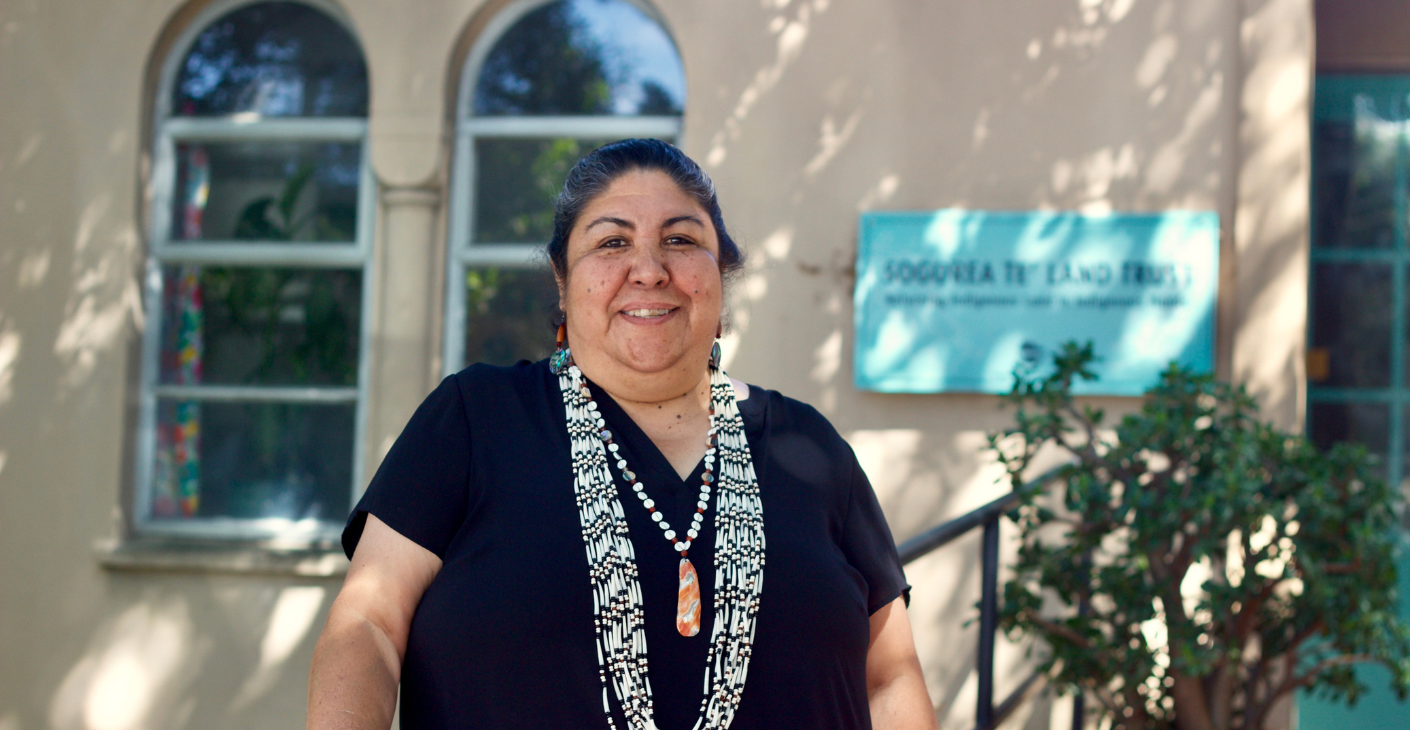In the Bay Area and across the country, awareness of Indigenous rights and the “land-back movement” seems to be growing. But this movement did not come out of nowhere; it has taken decades of activism and education to get this far.
Corrina Gould is an Oakland-based leader who is spearheading local efforts to reverse the displacement of Native people, and to bring people back to Indigenous land, ceremonies and cultural practices. In 2015, Gould, along with Johnella LaRose, co-founded The Sogorea Te’ Land Trust, a nonprofit focusing on healing the wounds of colonization, particularly around land and waterways of the Bay Area.
For generations, Gould’s family lived in a part of Ohlone land that is now known as Oakland, as well as nearby areas. Her family had been enslaved in the missions – Mission Dolores in San Francisco, and Mission San Jose in Fremont. As a part of the Confederated Villages of Lisjan, she found that many of her relatives had been displaced, due to gentrification, out of the Bay Area. And those who remained did not own their own homes or land.
Beginning in the 1950s, people from different tribes were relocated to urban areas as part of the government’s effort to assimilate Indigenous people. Nationally, an estimated 100,000 people relocated as part of the program. Locally, Oakland was one of the cities where people from all over the country relocated. While the program was marketed as voluntary relocation, participants from reservations sometimes did not receive the benefits they were offered, including job training and education.
From an early age, Gould was passionate about advocating for her community. While in high school at Oakland Street Academy, an alternative school that encouraged students to speak out on injustice, Gould became an activist. Since then, she has worked in the Indigenous community through various organizations and nonprofits in the area.
Prior to starting The Sogorea Te’ Land Trust, Gould and LaRose had co-founded Indian People Organizing for Change. From 2005-2008, IPOC held a peace walk with allies from across the world, including Nipponzan Myohoji Buddhist monks. On the three-week journey, which covered roughly 20 miles per day, participants used a historic map from 1909 to locate and pray at shellmounds in West Berkeley, Oakland, Emeryville, and further south.
Describing where this hidden history lies, Gould said, “All of these places that people don’t see, under railroad tracks and bars and apartment buildings and schools. We laid down prayers, and asked our ancestors to remember us as we remember them.”
Later, IPOC joined a fight for a piece of land in Glen Cove in Vallejo, named Sogorea Te’, a Karkin Ohlone village and sacred site that was the inspiration for the nonprofit’s name. She recalls how the occupation of that land spanned four and a half months, with many people coming out to support them.
In 2012, Gould was invited to a meeting in Southern California where a group of Native-run land trusts were gathering. There, she learned about a different model of retaining land for Indigenous people in the form of land trusts. Soon after, LaRose and Gould started The Sogorea Te’ Land Trust, its name inspired by the land in Vallejo, as the first Indigenous and urban women-led land trust in the country.
Since then, Sogorea Te’ has partnered with community groups and public agencies to return a total of 50 acres of land throughout the East Bay to the organization. Under Sogorea Te’s care, much of the returned land is now being used to plant food and herbs used in traditional medicine, and for cultural events.
These efforts are all part of a broader, national movement to return Indigenous land, and bring Indigenous people back to their land. Gould says holding land itself is not an Indigenous concept, and yet this is the way to keep the land healthy for future generations.
“We’re taking care of [this land] so the next generation can take care of it,” Gould says.
By Momo Chang, SFF consultant


